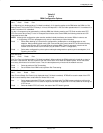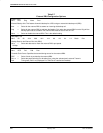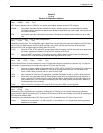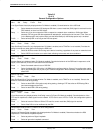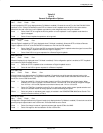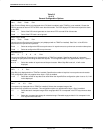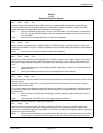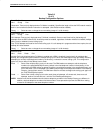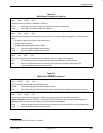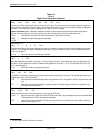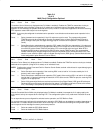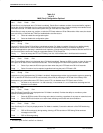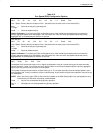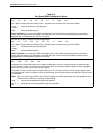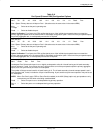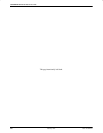
Configuring the Unit
5-233550-A2-GB20-10 February 1995
Table 5-10
MUX (Setup) Configuration Options
MUX Funct: Disab for MPTC; Enab for all other configurations
Next Enab Disab Prev
TDM/Flex Function
. Enables or disables the TDM/Flex.
Enab — Select when you want to enable the TDM/Flex and perform multiplexing.
Disab — Select when you want to disable the TDM/Flex.
Share DevA: Enab MPTT; Disab for all other configurations
Next Enab Disab Prev
Sharing Device A
. Enabling this configuration option allows you to create a digital-sharing group. The following rules
apply:
• All ports in a group must have the same port speed.
• All ports must be adjacent.
• A digital-sharing group can have 2 ports.
Enab — Select to enable the digital-sharing feature.
Disab — Select to disable the digital-sharing feature.
Port Cntrl: DSD for MPTT; Host for all other configurations
Next Host DSD Prev
Port Control
. Specifies how to handle contention between the ports in a digital-sharing group.
Host — Select if the Host protocol must enforce the order of transmission to avoid collisions.
DSD — Select for Digital-Sharing Device if selection of the next port to transmit is based upon the
lowest-numbered port that is ready to transmit.
Table 5-11
(1 of 4)
MUX (Port) Configuration Options*
DTE Port: EIA232
Next EIA232 V.35 Prev
DTE Port
. Selects the port data will be transmitted over.
EIA232 — Select when using the EIA-232 interface/connector.
V.35 — Select when using the V.35 interface/connector (a V.35 Interconnect Cable must be used on Port 2).
Async→Sync: Disab
Next Enab Disab Prev
Asynchronous-to-Synchronous Conversion
. Sets the port for asynchronous or synchronous operation.
Option Verification: When the TDM/Flex is enabled, the DSU verifies that the sum of the port speeds equals the
aggregate speed. The asynchronous setting
cannot
be specified as underspeed.
Enab — Select to configure the port as asynchronous (asynchronous-to-synchronous conversion takes place).
Disab — Select to configure the port as synchronous.
* The menu paths for Prt1 and Prt2 are identical.



